Nationalist Republican Alliance
The Nationalist Republican Alliance (Spanish: Alianza Republicana Nacionalista, ARENA) is a conservative,[5] right-wing[6] political party of El Salvador. It was founded on 30 September 1981 by retired Salvadoran soldier Roberto D'Aubuisson. It defines itself as a political institution constituted to defend the democratic, republican, and representative system of government, the social market economy system and nationalism.
Nationalist Republican Alliance Alianza Republicana Nacionalista | |
|---|---|
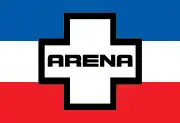 | |
| Leader | Érick Salguero |
| Founded | 30 September 1981 |
| Headquarters | Prolongación Calle Arce, entre 45 y 47 av N. #2429. Col. Flor Blanca, San Salvador, El Salvador |
| Ideology | Conservatism[1][2] Nationalism[3] Anti-communism[4] Economic liberalism[5] |
| Political position | Right-wing[6][7][8][9] |
| International affiliation | International Democrat Union |
| Regional affiliation | Union of Latin American Parties[10] |
| Colours | Blue, White and Red |
| PARLACEN group | Central American Democratic Alliance |
| Seats in the Legislative Assembly | 37 / 84 |
| Mayors | 140 / 262 |
| Central American Parliament | 8 / 20 |
| Website | |
| arena | |
ARENA controlled the National Assembly of El Salvador until 1985, and its party leader Alfredo Cristiani was elected to the presidency in 1989. ARENA controlled the presidency from 1989 until 2009. The party gained a plurality in the Legislative Assembly in 2012.
History
ARENA was founded in 1981 and was composed of former members from PCN. The party arose in response to "the insurgency of the Farabundo Martí National Liberation Front, FMLN, a group that united peasant farmers, unionists and intellectuals, which tried, through arms, to overthrow the dictatorship and to install a state regime inspired by the governments of revolutionary Cuba and Sandinista Nicaragua".
The ideology the party claims to believe in is a system of democratic and representative government, emphasizing individual rights, the family as the nucleus of society and the respect for private property.
In February 2007, three ARENA politicians were murdered in Guatemala, including Eduardo D'Aubuisson, the son of party founder Roberto D'Aubuisson, in what was considered by the police as a crime related to drugs.[11][12]
In 2009, ARENA took out a full-page ad in a Salvadorean newspaper calling on President Mauricio Funes to recognise the interim Honduran government of Roberto Micheletti installed after the military had expelled President Manuel Zelaya.[13]
Structure
The highest authority of the party ARENA is the Comité Ejecutivo Nacionalista (COENA, "Nationalist Executive Committee"), which consists of 13 members. The members must be re-elected annually through the General Assembly of ARENA members.
In addition to the COENA, there are 14 Directors-in-Chief, one for each department and departmental councils called "Juntas Directivas Conjuntas" to coordinate political work in their respective department. In each department, a director is chosen who works with a specific member of COENA. The director's role is to organize and co-ordinate electoral campaigns and help the councils form party structures in the municipalities of their departments.
On 19 February 2013, Jorge Velado assumed the position as president of COENA, in a party leadership shake-up aimed at re-energizing a stale organization tainted by its association with the violent death squads of the 1980s, widespread corruption and the switch to the U.S. dollar as the national currency.
Electoral record
At the legislative elections held on 16 March 2003, the party won 32.0% of the popular vote and 27 out of 84 seats in the Legislative Assembly. ARENA's successful candidate in El Salvador's 2004 presidential election was Antonio Saca. On 21 March 2004, Saca defeated Schafik Handal, the candidate of the left-wing Farabundo Martí National Liberation Front, by a margin of 58% to 36% with 70% turnout. He was sworn in as president the following 1 June.
In the 12 March 2006 legislative election, the party won 39.4% of the popular vote and 32 out of 84 seats. At the 18 January 2009 legislative elections, the party received 38.55% of the vote, and again won 32 of the 84 seats.
On 15 March 2009, ARENA candidate Rodrigo Ávila lost the presidential election to Mauricio Funes of the FMLN. After elections, the party president was changed to Alfredo Cristiani.
Electoral history
Presidential elections
| Election | Candidate | First round | Second round | Result | ||
|---|---|---|---|---|---|---|
| Votes | % | Votes | % | |||
| 1984 | Roberto D'Aubuisson | 376,917 | 29.77% |
651,741 | 46.41% |
Lost |
| 1989 | Alfredo Cristiani | 505,370 | 53.82% |
Elected | ||
| 1994 | Armando Calderón Sol | 641,108 | 49.03% |
818,264 | 68.35% |
Elected |
| 1999 | Francisco Flores | 614,268 | 51.96% |
Elected | ||
| 2004 | Antonio Saca | 1,314,436 | 57.71% |
Elected | ||
| 2009 | Rodrigo Ávila | 1,284,588 | 48.68% |
Lost | ||
| 2014 | Norman Quijano | 1,047,592 | 38.96% |
1,489,451 | 49.89% |
Lost |
| 2019 | Carlos Calleja | 857,084 | 31.72% |
Lost | ||
Legislative Assembly elections
| Election | Votes | % | Position | Seats | +/– | Status in legislature |
|---|---|---|---|---|---|---|
| 1982 | 286,665 | 29.28% | 19 / 60 |
Opposition | ||
| 1985 | 286,665 | 29.70% | 13 / 60 |
Opposition | ||
| 1988 | 447,696 | 48.10% | 31 / 60 |
Opposition | ||
| 1991 | 466,091 | 44.33% | 39 / 84 |
Government | ||
| 1994 | 605,775 | 45.03% | 39 / 84 |
Government | ||
| 1997 | 396,301 | 35.40% | 28 / 84 |
Government | ||
| 2000 | 436,169 | 36.04% | 29 / 84 |
Government | ||
| 2003 | 446,233 | 31.90% | 27 / 84 |
Government | ||
| 2006 | 620,117 | 39.40% | 34 / 84 |
Government | ||
| 2009 | 854,166 | 38.55% | 32 / 84 |
Opposition | ||
| 2012 | 620,117 | 39.40% | 34 / 84 |
Opposition | ||
| 2015 | 885,374 | 38.90% | 32 / 84 |
Opposition | ||
| 2018 | 886,365 | 41.72% | 37 / 84 |
Opposition |
ARENA Presidents of El Salvador
| ARENA (4) | |||||
|---|---|---|---|---|---|
| No. | Name (Birth–Death) | Portrait | Term of Office | Vice President | |
| 1 (40) |
Alfredo Cristiani (born 1947) | 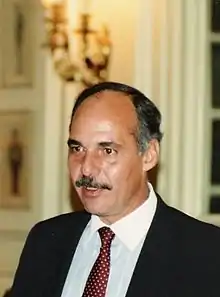 | 1 June 1989 | 1 June 1994 | José Francisco Merino López |
| 2 (41) |
Armando Calderón Sol (1948–2017) | 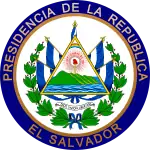 | 1 June 1994 | 1 June 1999 | Enrique Borgo Bustamante |
| 3 (42) |
Francisco Flores Pérez (1959–2016) | 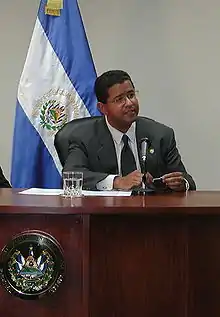 | 1 June 1999 | 1 June 2004 | Carlos Quintanilla Schmidt |
| 4 (43) |
Antonio Saca (born 1965) | 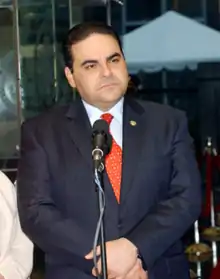 | 1 June 2004 | 1 June 2009 | Ana Vilma de Escobar |
References
- Middlebrook, Kevin J. (2000), "Conclusion", Conservative Parties, the Right, and Democracy in Latin America, JHU Press, p. 286, ISBN 9780801863868
- Bounds, Andrew (2001), "El Salvador: History", South America, Central America and the Caribbean 2002, Routledge, p. 384, ISBN 9781857431216
- Van Der Lijn, Jair (2006), Walking the Tightrope: Do UN peacekeeping operations actually contribute to durable peace?, Rozenberg Publishers, p. 252, ISBN 9036100372
- Middlebrook, Kevin J. (2000), "Introduction", Conservative Parties, the Right, and Democracy in Latin America, JHU Press, p. 26, ISBN 9780801863868
- "El Salvador's presidential election: A nation divided", The Economist, 12 March 2009
- Beetham, David (2002), "El Salvador", The State of Democracy, Kluwer Law International, p. 27, ISBN 9789041119315
- Wood, Elisabeth J. (2000), "Civil War and the Transformation of Elite Representation in El Salvador", Conservative Parties, the Right, and Democracy in Latin America, JHU Press, p. 243, ISBN 9780801863868
- "El Salvador", The Europa World Year Book 2008, Taylor & Francis, p. 1649, 2008
- Atkins, Stephen E. (2004), "ARENA", Encyclopedia of Modern Worldwide Extremists and Extremist Groups, Greenwood Press, p. 24, ISBN 9780313324857
- "Partidos Miembros".
- http://www.elfaro.net/es/201011/noticias/2911/
- "$5 Million Dollars and 20 Kilos of Cocaine". 18 November 2010. Retrieved 4 February 2019.
- CounterPunch, 22 July 2009, Back to the Future? Return to El Salvador
External links
- Official website (in Spanish)
- Youth wing website (in Spanish)
- Rodrigo Ávila's website (in Spanish)